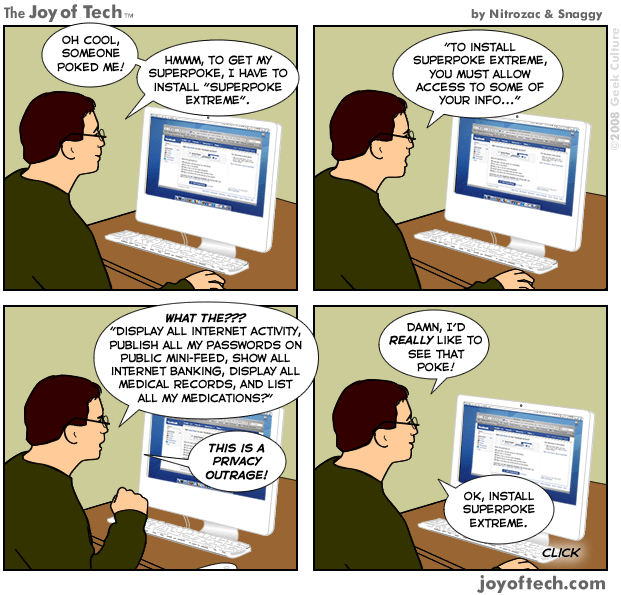Privacy Issue on Social Network Sites
Nowadays the privacy issue on Social Network Sites (SNS) is often being discussed. We all seem very concerned about whether the information we share on sites like Facebook are being shared with others, without our permission. We now are aware of the fact that our user profiles on Facebook, Hyves, MySpace etc. are being shared for advertising profits of third parties. But why do we share our private information and why should we be aware?
Facebook is THE way to keep in touch with people you’ve met through the years, and see what they’re up to. You share information, which you might not have shared in real life. In ‘Measurement and Analysis of Online Social Networks’, Mislove et al. outline a few ways in which an understanding of the structure of social networks can help us understand the impact of these networks. The main reason people share a lot of information is because users tend to trust each other. “For example, when a user receives an email form an other user, she is trusting the other party not to send spam. When the user selects a winning bidder in an auction, she is trusting the other party to pay the winning amount.” The same counts for a Facebook profile. When we ask the network holder to keep some information hidden from other users we don’t know, we trust them to not show that information. Therefore we don’t mind participating. But as we all know now, we can’t trust the fact that our data won’t be shared.
Another reason why we participate in SNS is because it gives us a sense of freedom and control. These sites give us the opportunity to be whoever we want to be. Wendy Chun (2006) argues that with all the freedom that the Internet provides, it also inherently brings about a sense of control. It is this sense of being in control of how the world perceives us that gives us the illusion of freedom. It’s an illusion because besides putting yourself out there by showing who you are, or who you want to be on for example a Facebook profile, you’re providing information that can en will be used by others. And because we tend to get paranoia when the illusion of a safe environment gets broken, Chun argues that we have to learn to cope with this uncertainty because there will always be uncertainties in the networked media. Only this way it is possible to experience freedom.

Narayanan and Shmatikov show how our data is used by attackers (of our privacy) and how they get away with it. In ‘De-anonimyzing Social Networks’ they argue that to legitimate the data shared by network holders, our names and addresses are being removed. So privacy is protected by anonimyzation. This is often misinterpreted as removal of “personal identifiable information”. But this personal identifiable information may include much more than just names and addresses. So anonymity has been interpreted as equivalent to privacy in a lot of cases of data-sharing.
The data sharing that’s been done, without your permission, may have negative consequences for you. You might end up having an email full of Spam or worse, you won’t be hired for a new job because they found inappropriate information about you. So there is a disconnect between users’ willingness to share information and their reaction to unintended parties viewing or using this information. Therefore we should be conscious of what we put out there. And when we do, we should consider whether we’re willing to share that information with the networked society and not just your friends.
What’s concerning is that the more the internet and our daily lives intertwine, the more information about us will be available online. So does this mean that we have to give in to the violation of our privacy, or are there ways to protect ourselves from these data ‘attackers’, without excluding ourselves from SNS?
Chun, Wendy. Control and Freedom. Power and Paranoia in the Age of Fiber
Optics. Cambridge, MA: The MIT Press, 2006
Mislove, Alan, Massimiliano Marcon, Krishna P. Gummadi,
Peter Druschel, Bobby Bhattacharjee. Measurement and Analysis of Online Social Networks. Max Planck Institute for Software Systems; Rice University & University of Maryland, 2007
Narayanan, Arvind, Vitaly Shmatikov. De-anonymizing Social Networks. The University of Texas at Austin